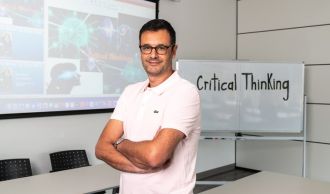Find a Camp

Brain Power’s innovative approach to teaching critical thinking positions young people to be mindful in the worlds of today and tomorrow.
How to exercise critical thinking in an effort to solve a difficult problem or confront a challenging situation in life? Critical thinking is a learned behaviour that involves putting aside preconceived notions or personal biases. Keeping an open mind helps us to navigate the complexities of our everyday lives whether we are 6 or 60.
“In essence, critical thinking affords students the ability to think independently, to think ‘outside the box.’ It involves a number of competencies by which you can then form judgments about the world,” says Dr. Joel Benabu, BA, PhD, instructor and Head of Toronto Campuses at Brain Power. With locations in Vaughan, Hamilton, and most recently, in North Toronto, Brain Power — a 30- year leader in enrichment for high-potential kids — fosters in students the capacity and know-how to become independent thinkers.
According to Dr. Benabu, critical thinking questions are unique in character: instead of yielding answers, they generate additional questions that uncover the complexities of an issue or problem. He adds, “It is a huge mistake to burden young people with solving the big existential problems they are to inherit. All this does is create anxiety. Instead, we should equip young people with tools that will help them ‘reason themselves out’ of the predicaments they face. Young people need to be given ample opportunity to acquire, rehearse and exercise the skills they will need in future.”
This becomes increasingly difficult in an age of misinformation and disinformation on social media, where most kids are never exposed to the nuances of facts or minority opinions, and knee-jerk reactions to comments online are the rule, not the exception. Brain Power has developed a singular, innovative curriculum, through which students learn to analyze and evaluate their own thinking processes and those of others. “Kids are not thinking critically about their thinking,” says Brain Power CEO and instructor, Vanessa Serra Iarocci.
Brain Power is the only player in the enrichment space today that teaches first-graders how to pose questions critically. Later in their training, Brain Power kids are taught to become self-examining, asking, What assumptions am I making? What data/evidence do I have to support my decision/position? And what biases do I have and am I ready to let go of them? “In my capacity as CEO, I have worked tirelessly to ensure that critical thinking forms the basis of our Language Arts, Math and Public Speaking courses,” says Serra Iarocci. Dr. Benabu, a Shakespeare scholar and a vetran instuctor of critical thinking, reading and writing at the University of Toronto, believes that young people are especially vulnerable to the onslaught of information that pervades their daily lives. “If every student is taught to evaluate information a little better, then we can keep the perils of misinformation and disinformation at bay. In so doing, we encourage our Brain Power students to consider who is generating information, how the ‘message’ has been framed and what the intention might be,” he says.
Brain Power’s overarching goal is to get kids to think critically about thinking, which is less about teaching facts and more about giving students the tools they need to develop their own pathways to knowledge.
Contact Name:
Brain Power Admissions Team
Phone Number:
click to view number
Website:
visit camp website